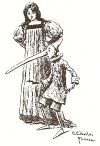Biography:Stephen Yablo
Stephen Yablo | |
|---|---|
 Yablo in 2022 | |
| Born | 30 September 1957 Toronto, Canada |
| Education | University of Toronto (B.Sc.) University of California, Berkeley (Ph.D.) |
| Spouse(s) | Sally Haslanger |
| Era | Contemporary philosophy |
| Region | Western philosophy |
| School | Analytic |
| Doctoral advisor | Donald Davidson |
| Doctoral students | Carolina Sartorio |
Main interests | Philosophical logic, philosophy of language, philosophy of mathematics, philosophy of mind |
Notable ideas | Yablo's paradox |
Stephen Yablo (/ˈjæbloʊ/;[1] born 1957) is a Canadian-born American philosopher. He is the Emeritus David W. Skinner Professor of Philosophy at the Massachusetts Institute of Technology (MIT) and taught previously at the University of Michigan, Ann Arbor.[2] He specializes in the philosophy of logic, philosophy of mind, metaphysics, philosophy of language, and philosophy of mathematics.
Life and career
He was born in Toronto, on 30 September 1957, to a Polish father Saul Yablo and Romanian-Canadian mother Gloria Yablo (née Herman), both Jewish.[3] He is married to fellow MIT philosopher Sally Haslanger.
His Ph.D. is from University of California, Berkeley, where he worked with Donald Davidson and George Myro. In 2012, he was elected a Fellow of the American Academy of Arts and Sciences.
Philosophical work
Yablo has published a number of influential papers in philosophy of mind, philosophy of language, and metaphysics, and gave the John Locke Lectures at Oxford in 2012, which formed the basis for his book Aboutness, which one reviewer described as "an important and far-reaching book that philosophers will be discussing for a long time."[4]
Yablo's paradox
In papers published in 1985[5] and 1993,[6] Yablo showed how to create a paradox similar to the liar paradox, but without self-reference. Unlike the liar paradox, which uses a single sentence, Yablo's paradox uses an infinite list of sentences, each referring to sentences occurring later in the list. Analysis of the list shows that there is no consistent way to assign truth values to any of its members. Since everything on the list refers only to later sentences, Yablo claims that his paradox is "not in any way circular". However, Graham Priest disputes this.[7][8]
Statement
Consider the following infinite set of sentences:
- S1: For each i > 1, Si is not true.
- S2: For each i > 2, Si is not true.
- S3: For each i > 3, Si is not true.
- ...
Analysis
For any n, the proposition Sn is of universally quantified form, expressing an unending number of claims (each the negation of a statement with a larger index). As a proposition, any Sn also expresses that Sn + 1 is not true, for example.
For any pair of numbers n and m with n < m, the proposition Sn subsumes all the claims also made by the later Sm. As this holds for all such pairs of numbers, one finds that all Sn imply any Sm with n < m. For example, any Sn implies Sn + 1.
Claims made by any of the propositions ("the next statement is not true") stand in contradiction with an implication we can also logically derive from the lot (the validity of the next statement is implied by the current one). This establishes that assuming any Sn leads to a contradiction. And this just means that all Sn are proven false.
But all Sn being false also exactly validates the very claims made by them. So we have the paradox that each sentence in Yablo's list is both not true and true.
First-order logic
For any , the negation introduction principle of propositional logic negates . So no consistent theory proves that one of its propositions equivalent to itself. Metalogically, it means any axiom of the form of such an equivalence is inconsistent. This is one formal pendant of the liar paradox.
Similarly, for any unary predicate and if is an entire transitive relation, then by a formal analysis as above, predicate logic negates the universal closure of
On the natural numbers, for taken to be equality "", this also follows from the analysis of the liar paradox. For taken to be the standard order "", it is still possible to obtain a non-standard model of arithmetic for the omega-inconsistent theory defined by adjoining all the equivalences individually.[9]
Books
- Thoughts (Philosophical Papers, volume 1) (Oxford University Press, 2009)
- Things (Philosophical Papers, volume 2) (Oxford University Press, 2010)
- Aboutness (Princeton University Press, 2014).
References
- ↑ Are Ontological Questions Really Only About *HOW* Things Exist? on YouTube
- ↑ "Yablo". http://www.mit.edu/~yablo/cv.pdf.
- ↑ Tremain, Shelley (2018-08-15). "Dialogues on Disability: Shelley Tremain Interviews Stephen Yablo". https://philosophycommons.typepad.com/disability_and_disadvanta/2018/08/dialogues-on-disability-shelley-tremain-interviews-stephen-yablo.html.
- ↑ Morton, Adam (10 September 2014). "Aboutness". https://ndpr.nd.edu/news/50261-aboutness/.
- ↑ S. Yablo (1985). "Truth and reflection". Journal of Philosophical Logic 14 (2): 297–348. doi:10.1007/BF00249368. https://www.researchgate.net/publication/226983444.
- ↑ S. Yablo (1993). "Paradox Without Self-Reference". Analysis 53 (4): 251–252. doi:10.1093/analys/53.4.251. https://www.mit.edu/~yablo/pwsr.pdf.
- ↑ G. Priest (1997). "Yablo's paradox". Analysis 57 (4): 236–242. doi:10.1093/analys/57.4.236.
- ↑ J. Beall (2001). "Is Yablo's paradox non-circular?". Analysis 61 (3): 176–187. doi:10.1093/analys/61.3.176. http://ferenc.andrasek.hu/papersybprx/jcbeal_is_yablo_non_circular.pdf.
- ↑ Yablo’s Paradox and ω-Inconsistency, Ketland
External links
- "Liar Paradox". Internet Encyclopedia of Philosophy. http://www.iep.utm.edu/par-liar.
- "Yablo's Paradox". Internet Encyclopedia of Philosophy. http://www.iep.utm.edu/yablo-pa.
- "Paradox Without Self-Reference" - Analysis, vol. 53 (1993), pp. 251–52
- "Mental Causation" - The Philosophical Review, vol. 101, issue 2 (1992), pp. 245–280
- "Go Figure: A Path Through Fictionalism"
- Interview at 3:AM Magazine
- Interview at What is it like to be a philosopher?
 |



